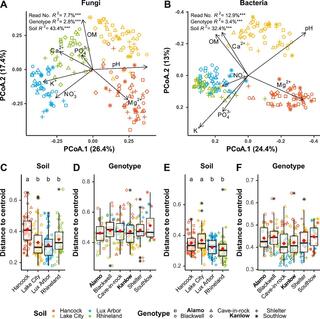Soil origin and plant genotype modulate switchgrass aboveground productivity and root microbiome assembly
P. Beschoren de Costa et al. "Soil origin and plant genotype modulate switchgrass aboveground productivity and root microbiome assembly" mBio 13 (2022) [DOI:10.1128/mbio.00079-22]
Greenhouse gas reduction, carbon sequestration, and environmental remediation are top research themes within the U.S. Department of Energy funded bioenergy research centers. The utilization of unproductive agricultural land for bioenergy crop production is one of the most promising directions to achieve these goals. Switchgrass is a model biofuel system: it is adapted to a wide variety of geographical regions in North America, it is protective of soil and water resources, and it can be productive in low-fertility soils, but its profitability depends greatly on the biomass yield. Beneficial microbes have known roles in modulating plant biomass production but their interaction with soil geography, and switchgrass cultivars were not thoroughly studied. This study aims to fill important knowledge gaps and to serve as a foundation for switchgrass biomass promotion through microbe selection with an ultimate goal of facilitating sustainable bioenergy crop production.
Original, demultiplexed, sequence data reads are available in the Sequence Read Archive under the BioProject accession PRJNA785605. Sanger sequences have been deposited to GenBank under accession numbers OM106204 to OM106850, and OM445531 to OM445972. All data needed to reproduce the analyses and the developed R code are provided on GitHub.
